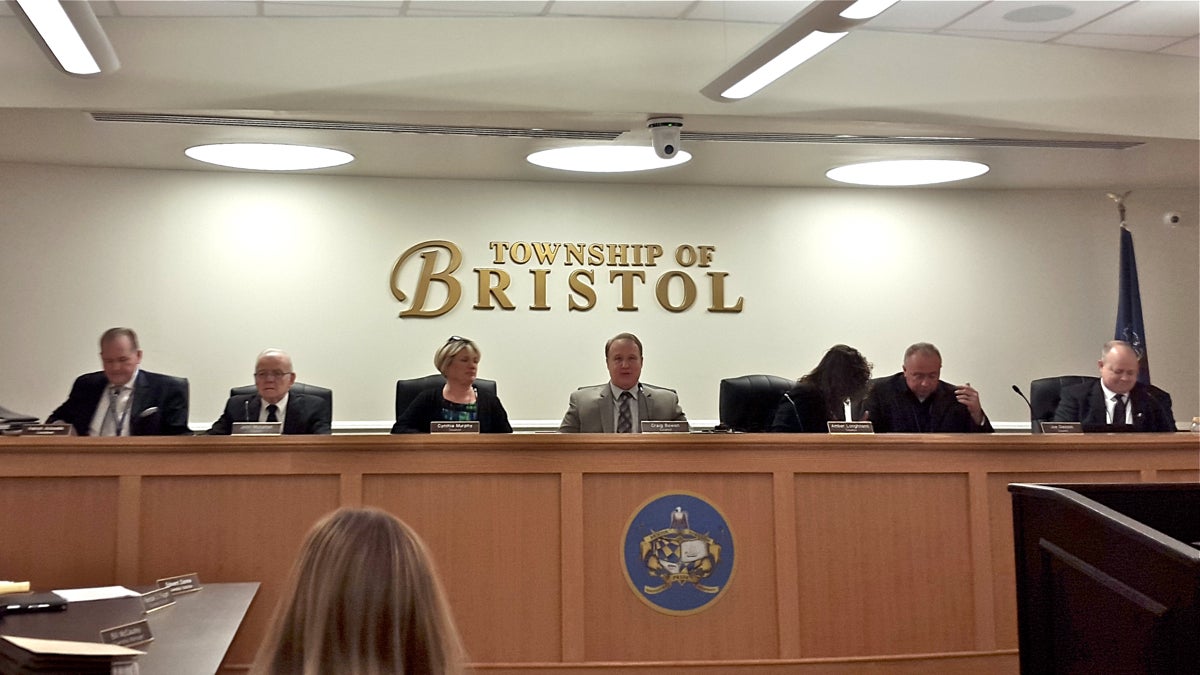After nearly 100 recovery homes move in, Bristol Township acts to ‘stay’ their growth
Listen
The Bristol Township Council passed a resolution for a six-month stay on new recovery, or "sober living," houses. (Laura Benshoff/WHYY)
For the last four months, residents of Bristol Township in Lower Bucks County have brought their complaints about what they say is an onslaught of recovery homes to the township council.
“We have five of them within a quarter mile of our home,” said Debbie Fleming, who lives in Goldenridge. “I can look out my kitchen window to the right, I see one. Look to the left, I see one.”
“You feel like you’re in prison living in your own neighborhood,” said her neighbor George Kerner, who has lived in Bristol for 42 years.
The township officials now count over 90 recognized recovery homes — places where people live while going through drug and alcohol treatment — and believe there are dozens more flying under the radar.
The township council passed a resolution Thursday night that the solicitor called the “first step” toward a zoning ordinance that would rein in the area’s multiplying recovery homes. While it was not announced at the meeting, the resolution also provided the township with a way to temporarily bar new recovery homes.
“According to [the township solicitor], it will give us an 180-day stay to rectify our zoning,” said Councilwoman Amber Longhitano.
For the next six months, said solicitor Randall Flager, “the township has the option not to entertain” new recovery homes under the “pending-ordinance doctrine.” New recovery house applicants may be denied use and occupancy permits or other paperwork needed to take boarders while the municipality tinkers with its zoning code.
Neighboring Falls Township, which has far fewer recovery homes, passed an ordinance last month that restricts where the homes could be located.
A matter of balance
But municipal officials in Lower Bucks have to balance the residents’ concerns against what is legal.
“Congress specifically said if you have a history of addiction … you are considered or can be considered a person with a disability” and therefore be covered by the Fair Housing Act, said disability rights attorney Michael Allen.
Ordinances like the one in Falls have tended to crumble when held up to scrutiny in court, he said.
However, he said, case law in Pennsylvania is confusing because of the many small municipalities that each make their own zoning decisions.
Longhitano said the township tried to take into consideration this “spiderweb” of cases when passing its resolution. She said she doesn’t know what would happen if a new recovery home applicant fought the township on its stay.
Some of the residents, including Fleming and Kerner, walked out of the meeting disappointed after the resolution passed. They saw it as kicking the can down the road via the hastily added resolution to “declare invalid portions of the township zoning.”
The news that new recovery homes would be halted came as a relief to Fleming.
“None of us, nobody, objects to recovery homes,” she said. “What we object to is institutionalizing our township.”
Five years ago, Bristol had around 25 recovery homes, according to state Rep. Tina Davis. A collision of factors contributed to a sharp upswing in Lower Bucks: plentiful and cheap rental properties; access to treatment centers; and the growing numbers of people living with addiction everywhere.
WHYY is your source for fact-based, in-depth journalism and information. As a nonprofit organization, we rely on financial support from readers like you. Please give today.

